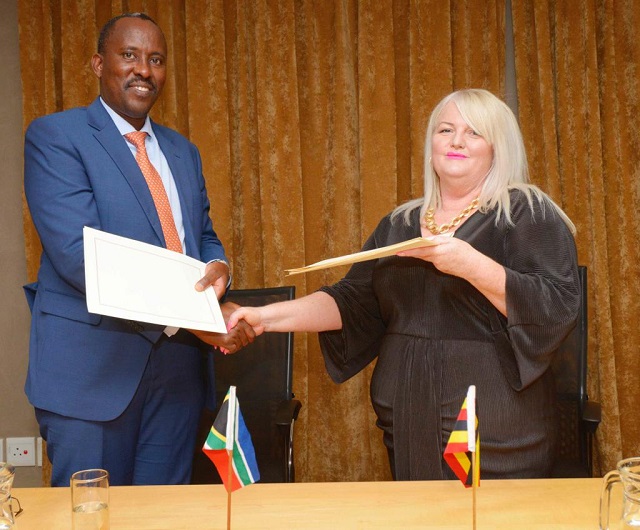
Kampala, Uganda | THE INDEPENDENT | Uganda and South Africa have eased tax procedures for exporters on both sides, aimed at enhancing the movement of goods between the two countries.
During the South Africa Uganda Business Forum in Pretoria, the two countries’ revenue bodies signed a Mutual Recognition Agreement on Authorities Economic Operators, AEOs.
The deal between Uganda Revenue Authority-URA, and the South Africa Revenue Services was described as vital for trade facilitation among the two African countries as AEOs from either country will access faster controls and reduced supervision for customs clearance.
According to the World Customs Organisation, an AEO is “a party involved in the international movement of goods that has been approved by, or on behalf of a national customs administration as complying with WCO or equivalent supply chain security standards.”
“The importance of coordinated similar programs lies in the ultimate goal of getting all national programs cooperatively recognized, meaning that AEO accreditations have the same value everywhere,” says URA Commissioner General John Musinguzi Rujoki. This leads to secure supply chains being established.
The two-way benefits of the MRA include reduced document check rates, relatively low inspection rates for import consignments, priority treatment of AEOs, prioritised customs clearance, and direct communication between participants in case of matters arising during clearance.
Consequently, South African and Ugandan accredited traders will enjoy lower trade costs and simplified procedures in their import and export activities through this arrangement. AEOs are trusted to be and expected that even with less surveillance, they can assess themselves and pay taxes.
In Uganda, these account for two fifths of imports and exports. “We have 118 AEOs who are responsible for more than 41% of the volumes of our international trade operations. This means over 41% of our supply chain operations are handled by low-risk and reliable operators who benefit from managing themselves,” says Musinguzi.
This was one of the main achievements of the summit, and is expected to be followed by other decisions by the two governments. South Africa’s Foreign Affairs Minister Naledi Pandor says they want ton increase investments from the south to Uganda.
Reports from South Africa also show that the two countries have agreed to continue with talks about the possibility of holders of the Ugandan passport entering South Africa without the need of a visa.
This was one of the items that were expected to dominate talks at the forum as one of the major non-tariff barriers. South African citizens are given visas on arrival in Uganda, but until now, Pretoria had never reciprocated, while in East Africa, Kenyans enjoy visa-free entry to the country.
Minister Naledi Pandor told journalists that there many issues that the two countries still have to resolve so as to improve trade flow.
She says there are challenges on either side, considering that the number of South African businesses in Uganda have dropped by half to 36.
Odrek Rwabwogo, the Presidential Advisory Committee head on Trade and Industrial Development also called for a reciprocal move by Pretoria on the visa, but urged Ugandans to respect travel regulations. Rwabwogo, who mobilized the Ugandan delegation to the Forum said the visa was not the only challenge the two countries find trading with each other.
The business forum, the first between the two countries, was organised under the theme: “Boosting Trade and Investment Relations between South Africa and Uganda.”
South Africa’s Trade and Industry Minister Ebrahim Patel said at about 100 million dollars (360 billion shillings), trade between Uganda was too low and must be increased to take advantage of the ‘historical relations between the countries.’
He said there is need to also increase investment infrastructure between the countries.
Currently, some Ugandans travel by road through Tanzania and Malawi, taking days before reaching the country’s borders. Recently, Uganda Airlines, hardly two years in operation of the Entebbe-Johannesburg route, has seen increase in demand, but mostly for passengers.
This week, it will increase weekly flights from three to four, to meet the growing demand. On the challenges, Yolanda Cuba, MTN Vice President Southern and East Africa, said they are finding it hard operating the subsidiaries because of the business environment.
“We actually operate at the behest, at the pleasures of the host countries and therefore, it is important to comply with their own laws. What we are trying to do to the best of our efforts is to ensure that where there are bottlenecks to do business in their country, we try and facilitate conversation and discussions to make it more seamless. Of-course there are challenges,” she said.
Other sectors, apart from telecommunications, that the South Africans have invested in in Uganda include banking, Education and Retail. Shoprite, Game and SABMiller are some of the companies that have exited Uganda over the recent years.
*****
URN
 The Independent Uganda: You get the Truth we Pay the Price
The Independent Uganda: You get the Truth we Pay the Price



